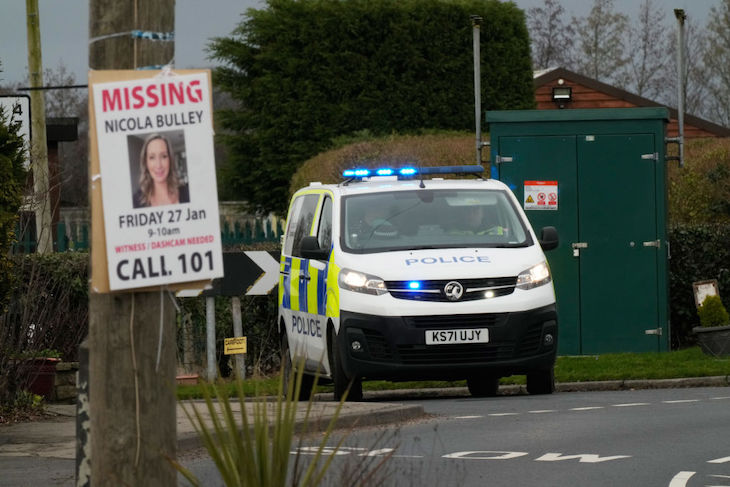The storm that has engulfed Lancashire Police – after the force revealed that missing mum Nicola Bulley had ‘issues with alcohol’ – has been a long time brewing.
Since February 29 2012 to be precise. The Leveson Inquiry into press wrongdoing was in full flow when, on that leap year day 11 years ago, the Met Police made a public admission: they had indeed loaned an old police horse to Rebekah Brooks. This was perfectly normal, they argued. The horse needed somewhere to live and the News UK chief paid for its upkeep. But the episode came to symbolise what the press’s many critics had long insisted was a too-cosy relationship between police and media.
Panicked by this accusation, senior police officers tore up the rule book. The long-established working relationship between police and the media was derailed from that moment – and the apparent shambles that has been the police’s handling of the Nicola Bulley inquiry is one of its many consequences.
A mood of paranoia around the media had gripped the police
For decades it had been perfectly normal for a local newspaper reporter to have a weekly meeting with a duty sergeant at the police station who would read out entries of all logged crimes. It was cosy – there’d be tea and biscuits – but it was also productive and mutually beneficial. On bigger cases – as with lobby briefings in parliament – there would be regular off-camera briefings for the nationals.
But after Leveson all this stopped. Officers were told to drop unauthorised contact with journalists. If they knew one socially they must report themselves. Crime reporters suddenly had all the cachet with police that girls’ school teachers acquired under the Taliban.
When Rolf Harris was arrested in 2013 every journalist in Britain knew about it for weeks before it was finally reported publicly – because the police doggedly refused to confirm it. This despite the established fact that the ‘more victims have since come forward’ impetus that such reports can prompt is often the key to a conviction in sex offence cases which are otherwise his word against (very often) hers. Things only worsened after the Sir Cliff Richard debacle, his exoneration and the singer’s subsequent legal action against the BBC after the Corporation filmed a police raid on his home.
A mood of paranoia around the media had gripped the police. It’s never let up since. The ‘don’t talk to the media’ mindset became entrenched. This has long been a frustration for the press but it’s increasingly clear that the police are suffering its consequences just as badly.
Nothing illustrated this better than events in Lancashire over recent weeks. Three weeks into the search for Nicola Bulley – a case which was dominating the news cycle – they revealed personal information about her. These revelations provoked howls of indignation that extended all the way from the diver who’d been looking for her in the river to the Home Secretary, from the Guardian to the Daily Mail.
If they thought these details were important why had they not released them earlier? Why was it relevant at all? Why had they days earlier said there were ‘no significant issues involving Nicola’s health’? And, from journalists’ viewpoint, why hadn’t the media been informed earlier?
As Stephen Wright, who did the crime beat at the Daily Mail for years, put it: ‘If media outlets had been told, in the strictest confidence, of this important context to her case then it [the Bulley case] might not have turned into the circus that it arguably has.’
Martin Brunt, veteran crime reporter at Sky News, wrote at the weekend: ‘Once upon a time, believe it or not, detectives in high-profile cases took journalists into their confidence and privately explained what they were thinking.’
Another national paper crime editor told me anonymously: ‘They had already lost control of the narrative – they weren’t providing updates so the media began looking for their own. Then they thought they could kill the story with the ‘drinking and menopause’ briefing – but completely predictably it blew up in their faces.’
Another said: ‘I think the police have lost sight of what the word media even means – a medium of communication. They claim to espouse notions of openness and transparency but in reality they have brought the shutters down and in so doing have locked themselves away from the public.’
The Nicola Bulley fiasco is by no means an isolated example of communication failure. Following the death of 16-year-old trans girl Brianna Ghey earlier this month, Cheshire Police said there was no indication the murder was a hate crime – only to subsequently suggest all lines of inquiry were being explored, ‘including whether this was a hate crime’.
Away from these high-profile cases, there’s a more general sense that police have lost the idea that how they appear – the very essence of public relations – is important in itself. In episodes like the arrest of women at a vigil for Sarah Everard, there has been a more general failure to read the room.
If their own press team had a closer connection to the media, they could influence how these events are policed in advance; there is currently no sense that this happens at all. And after Wayne Couzens and David Carrick, police forces don’t seem to have comprehended the extent to which they are no longer trusted.






Comments